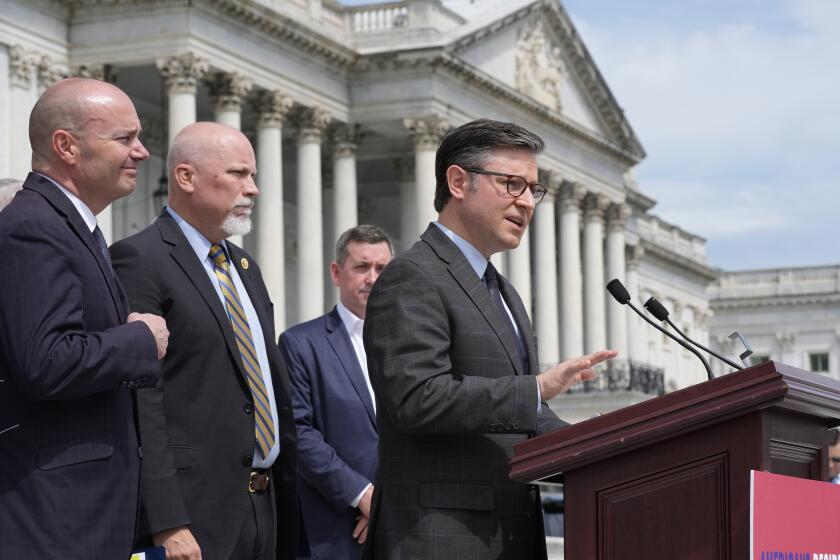Report Says Mistaken Arrest Was Due to FBI’s Sloppy Work
The FBI was sloppy and arrogant in its investigation of Oregon lawyer Brandon Mayfield, but the agency did not misuse the Patriot Act or break any laws, according to a government report released Friday.
The review by the Office of the Inspector General -- the Justice Department’s internal watchdog -- found that FBI fingerprint experts had made numerous mistakes in identifying a print as belonging to Mayfield during the investigation of the 2004 Madrid train bombings.
The fingerprint found on a bag of detonators near the bombings was similar to Mayfield’s, but FBI experts overlooked “important differences” between the prints, Inspector General Glenn A. Fine said. Furthermore, he said, the FBI ignored information from Spanish police that pointed to another suspect.
“We believe that the FBI Laboratory’s overconfidence in the skill and superiority of its examiners prevented it from taking the [Spanish report] as seriously as it should have,” Fine said in a 20-page summary of the report. The full report, containing about 270 pages, remains classified.
In his summary, Fine also said that FBI agents had made inaccurate and vague statements to a federal judge to obtain warrants to search Mayfield’s Portland-area home and to eventually arrest Mayfield. In one instance, agents led a judge to believe that U.S. and Spanish authorities agreed that the print on the bag was Mayfield’s.
The fingerprint eventually was found to belong to an Algerian national, and the FBI -- which held Mayfield in a Portland jail for two weeks, with as many as 22 hours a day of solitary confinement -- released him and publicly admitted its mistake.
Mayfield, 39, is suing the FBI and the Justice Department on charges that they violated his civil rights and invaded his privacy.
Mayfield could not be reached for comment, but his attorney, Gerry Spence, said the report’s conclusions “substantiate Mr. Mayfield’s allegations that the FBI acted with gross negligence.”
Spence said the report also confirmed his belief that “if it were not for the Spanish police, Mr. Mayfield would have been charged with a death-penalty offense and probably convicted.”
The FBI said in a statement from Washington, D.C., that Mayfield’s arrest in May 2004 “was based on an extremely unusual confluence of events” and that the agency had since implemented a number of measures to “minimize the risk of occurrence of a mistake.”
Those measures included a complete review of prior digital fingerprint identifications and a monthly review of cases involving death row inmates who were convicted or sentenced based on FBI fingerprint identification.
The inspector general’s report, however, said the FBI’s measures did not go far enough, and recommended further changes, such as a revision of the agency’s standard operating procedures to include “greater detail” in matching prints and “meaningful minimum documentation requirements for identifications.”
Mayfield, who filed his suit in October, claims the government targeted him because of his Muslim faith -- something the FBI has vigorously denied. The inspector general’s report seemed to provide ammunition for both sides.
The inspector general, the report said, looked into whether FBI fingerprint examiners “were improperly influenced by knowledge of Mayfield’s religion when they made the identification.”
Fine said his reviewers concluded that the examiners were not aware of Mayfield’s faith at the onset, but that the subsequent investigation and arrest might have been fueled in part by the FBI’s discovery that Mayfield was a Muslim convert, had once represented a suspected terrorist, and had contacts among local Muslims.
“One of the examiners candidly admitted that if the person identified had been someone without these characteristics, like the ‘Maytag repairman,’ the laboratory might have revisited the identification with more skepticism and caught the error,” the report said.
The case began in March 2004, when a series of bombings killed 191 people and injured 1,400 in Madrid. Shortly after, Spanish police found the bag of detonators and asked for the FBI’s help in identifying the fingerprint.
After the FBI incorrectly determined that the print belonged to Mayfield, agents began 24-hour surveillance of him and his activities. The surveillance included several “sneak and peek” searches conducted when no one was home.
According to the inspector general’s report, the FBI decided to arrest Mayfield more quickly than it would have wanted, fearing that members of the news media -- which had begun inquiring into an “American suspect” in the Madrid bombings -- would expose the investigation and cause Mayfield to flee.
Mayfield was arrested May 6, 2004, and held as a material witness. After Mayfield spent two weeks in detention, the FBI retracted its identification, and released him under a storm of public criticism that the agency had abused its powers under the Patriot Act.
The report found that the FBI did not abuse its powers, but conceded that the Patriot Act, which gives the government expanded authority in terrorism cases, allowed a level of coordination among investigative agencies and prosecutors that fueled and fomented the case against Mayfield.
“We did not find any evidence that the FBI misused any of the provisions of the Patriot Act in conducting its investigation of Mayfield,” the report said. “However, the increased information sharing allowed by the Patriot Act amplified the consequences of the FBI’s fingerprint misidentification.”
More to Read
Start your day right
Sign up for Essential California for news, features and recommendations from the L.A. Times and beyond in your inbox six days a week.
You may occasionally receive promotional content from the Los Angeles Times.






